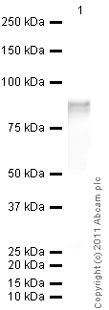Recombinant Human C-X-C Motif Chemokine 14/CXCL14
| Product name: | Recombinant Human C-X-C Motif Chemokine 14/CXCL14 |
| Source: | E.coli |
| Purity: | Greater than 95% as determined by reducing SDS-PAGE. |
| Buffer Formulation: | Lyophilized from a 0.2 μm filtered solution of 20mM TrisHCl, 1M NaCl, pH 8.5. |
| Applications: | Applications:SDS-PAGE; WB; ELISA; IP. |
| Storage: | Avoid repeated freeze/thaw cycles. Store at 2-8 oC for one month. Aliquot and store at -80 oC for 12 months. |
| UOM: | 100ug/50ug/200ug/1mg/1g |
| Source | E.coli |
| Description | Recombinant Human C-X-C Motif Chemokine 14 is produced by our E.coli expression system and the target gene encoding Ser35-Glu111 is expressed. |
| Names | C-X-C Motif Chemokine 14, Chemokine BRAKm MIP-2G, Small-Inducible Cytokine B14, CXCL14, MIP2G, NJAC, SCYB14 |
| Accession # | O95715 |
| Formulation | Lyophilized from a 0.2 μm filtered solution of 20mM TrisHCl, 1M NaCl, pH 8.5. |
| Shipping |
The product is shipped at ambient temperature. |
| Reconstitution |
Always centrifuge tubes before opening. Do not mix by vortex or pipetting. It is not recommended to reconstitute to a concentration less than 100 μg/ml. Dissolve the lyophilized protein in ddH2O. Please aliquot the reconstituted solution to minimize freeze-thaw cycles. |
| Storage |
Lyophilized protein should be stored at < -20°C, though stable at room temperature for 3 weeks. Reconstituted protein solution can be stored at 4-7°C for 2-7 days. Aliquots of reconstituted samples are stable at < -20°C for 3 months. |
| Biological Activity |
ED50 is 1.0-10.0 ng/ml. |
| Purity |
Greater than 95% as determined by reducing SDS-PAGE. |
| Endotoxin | Less than 0.1 ng/µg (1 IEU/µg) as determined by LAL test. |
| Amino Acid Sequence |
SKCKCSRKGPKIRYSDVKKLEMKPKYPHCEEKMVIITTKSVSRYRGQEHCLHPKLQSTKRFIKWY NAWNEKRRVYEE
|
| Background | Human Chemokine (C-X-C Motif) Ligand 14 (CXCL14) is constitutively expressed in certain normal tissues but is reduced or absent from many established tumor cell lines and human cancers. CXCL14 is known to be a chemoattractant for monocyte and dendritic cells. CXCL14 inhibits angiogenesis and exhibits antimicrobial activities. Mature human and mouse CXCL14 differ by only 2 amino acid residues. |














